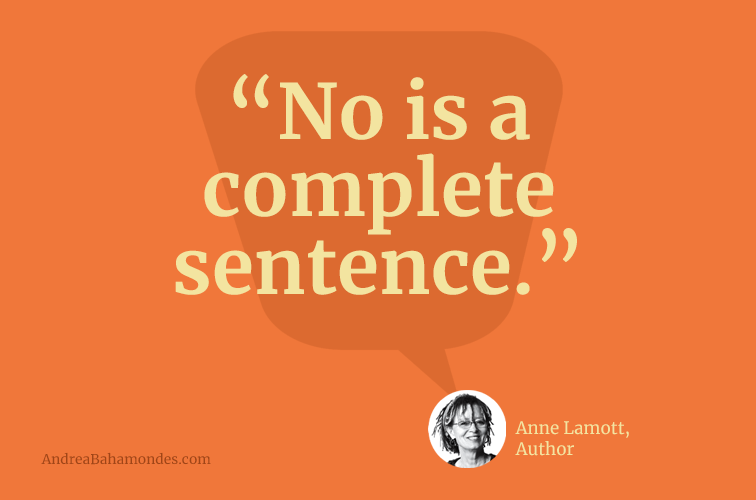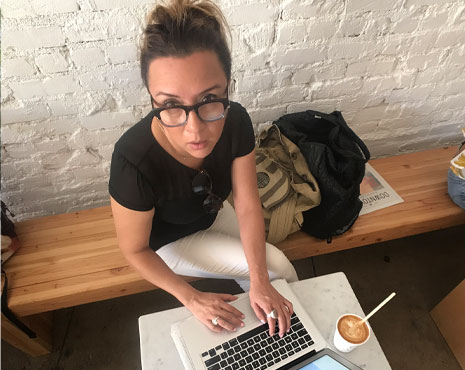Can you tell me a quick story about resentment, frustration, and guilt trips, but with a positive ending?
That’s what I’m setting myself to do today, wish me luck! (All characters are adapted for obvious reasons).
Here goes…
Jennifer has been dealing with her narcissistic mother sucking every drop of energy left in her. Nothing left in the tank to focus on her own needs and even the things she wants to do like being fully present in her time with the kids, going to dinner with the hubby, and not even enrolling in that ceramics class she keeps postponing.
It’s very easy to develop all kinds of feelings around a situation like this. Not only the obvious resentment towards her mom for trapping her emotionally, but also the self-induced guilt trip when she doesn’t allow that trap to take over her time and space.
This is a very vicious circle that goes from resentment to guilt, back to resentment, you get the picture.
Naturally, this has put a dent in their relationship over time.
But then… A twist.
During our conversation, she shares how, during the day, she needs to check on her mom constantly, check her messages and emails, and even engage in very long and heavy conversations.

Suddenly her tone and face change, it all goes from the same old complaint to the eye-opening realization that she is the one initiating all this! Not mom.
Jennifer immediately recognizes that she’s been crossing her own boundary and how often she puts herself in the situation. She’s been willingly drinking someone else’s poison.
The feel-good ending?
Of course, this awareness allows Jennifer to make changes. She has now established her own boundaries and has talked to her mom about it. They now have a weekly call, unless there is an emergency of course, and have included the sister too, so Jennifer is no longer the only one caring for mom.
And this, my friend, it’s called: Boundaries. More specifically: Emotional Boundaries.
Let’s make sure you’re not drinking someone else’s poison…
Emotional boundaries are very important when it comes to your mental health.
We’re all very familiar with setting boundaries for time and space. But, it is not often that we become aware when we need other types of boundaries, like emotional ones.
Think about it, every day you are presented with several opportunities to get hurt, lose track of your goals, get manipulated into conversations, you name it.
Yup, pretty much like sitting ducks for emotional attacks!
In this post, we’ll look at what emotional boundaries are, why they’re necessary, and how to properly set them to protect your mental health.
What are Emotional Boundaries
Carla Marie Manly, Ph.D. said that “boundaries are the separations that humans need—mentally, emotionally, and physically—to feel safe, valued, and respected.”
We’ll focus on emotional boundaries, which are a form of self-care because they protect you from negative influences from others and help control your emotions.
It’s a personal limit you set for yourself. You decide what kind of behavior or language is acceptable for you or how much you tolerate. Just like a fence around your home, but these boundaries protect your emotions, thoughts, and your well-being.
If you have solid boundaries, you can be more assertive in communicating your needs and wants, and you can make decisions that are in alignment with your values.
Bottom line…
Take an umbrella with you if it’s raining, wear sunblock if you’re hitting the beach, and get yourself some boundaries, nobody wants to be an emotional punching bag for other people!
Why you need to set emotional boundaries
You might be here because you have a general idea to protect your overall mental health, but it is good to know why specifically you need to set boundaries.
For example:
Protecting Yourself from Emotional Harm
When you allow others to step over your boundaries, you become vulnerable to emotional harm, which can take many different forms like manipulation, guilt-trips, how about when someone expects you to be there for them all the time, but doesn’t reciprocate.
It’s called self-preservation and it is an essential part of self-care.
Maintaining Mental Health
When you set emotional boundaries, you draw a line between acceptable and unacceptable behaviors. When done properly, it will reduce stress, anxiety, and frustration, which are all elements usually present in unhealthy relationships.
Achieving Personal Goals
Emotional boundaries are also essential for achieving anything because they allow you to stay focused on what’s important to you instead of getting sidetracked by the emotional needs of others.
If you protect your mental health and your emotional energy, you’ll be able to work on your goals with more confidence.
When do you need Emotional Boundaries?
As you can imagine, there are many situations when you should set some boundaries.
Some might be just in the moment, like a conspiracy theorist at a party you were otherwise enjoying. Or maybe a little more permanent, like a toxic coworker you have to deal with on a daily basis, or that friend that always drains all your energy.
Toxic Relationships
There are many scenarios where you need to set some boundaries, the most common is in relationships, whether it’s romantic, just a friend, or a family member.
And there are toxic relationships, in which one or both individuals consistently engage in abusive behavior toward one another.
They are usually difficult and can sometimes be hard to identify or deal with because they don’t always start that way, they usually develop over time.
Identifying Boundary-Crossing Behaviors
You need to be able to identify which emotional boundary is being crossed, but for that, you need to know what those boundaries are in the first place.
Once you have intentionally set your boundaries, they’ll be easier to be identified as they are being crossed.
- Invasion of Privacy: Too many personal or uncomfortable questions? Going through your things without permission? Yup, these are clear signs that someone is stepping all over your emotional boundaries
- Emotional Manipulation: Someone trying to manipulate your emotions, playing sneaky mind games in order to control you. The perfect example: A guilt trip
- Disrespect: Someone belittling you, speaking to you in a condescending manner, or simply making fun is disrespectfully crossing
- Overstepping Bounds: That friend constantly pushing you out of your comfort zone or trying to control your life, they are crossing your emotional boundaries.
- Gaslighting: A form of emotional abuse. Someone denies the validity of your feelings, experiences, or reality through constant lies, distractions, discrediting, and minimizing your thoughts and feelings.
How to Set Emotional Boundaries
So, we’ve covered what emotional boundaries are and why they’re important, now let’s move on to the How, which is why you’re here.
Believe me, It’s not as hard as it sounds, and the difference it can make in your overall well-being is amazing. Here are a few steps for setting emotional boundaries:
Identify your needs and wants
The first step is to identify what you need, and what you are comfortable with. How you want to be treated in a relationship, how you handle a conflict, or how you manage your time and energy.
These are all questions you must ask yourself in order to create emotional boundaries.
Crystal clear communications
Next step is to communicate your boundaries to others. Clearly, very clearly.
You can choose your delivery method but, in my experience, it depends on who is in front of you. It could be a simple conversation if the person is very close to you, maybe something different with friends, coworkers, etc.
Did I mention you should be clear? Oh okay…
Learn to say “no”
Is saying “no” difficult for you?
This is crucial for maintaining your emotional boundaries. If you’re feeling overwhelmed or drained, it’s okay to decline invitations or requests that don’t align with the boundaries you have set.

You gotta love the quote from Anne Lamott, she really hits it right on the head.
Make that a hard “no” and never follow with explanations or excuses.
Be consistent
You have to be consistent in upholding your boundaries. Always following through and not giving in to pressure from others.
Oh yeah, others will try to change them.
Practice Self-Care
Finally, it’s important to practice self-care in order to reinforce your emotional boundaries. Try to engage in activities that bring you joy, connect with loved ones, and always take time to recharge.
By following these steps to set effective emotional boundaries and protect your mental health while achieving your personal goals. Remember, this is a process and it may take time to get used to, but with practice, it will become second nature.
Communicating your Emotional Boundaries
There are several ways to communicate when setting your emotional boundaries:
Be specific
Be very clear and specific when communicating the reasons behind them. Don’t be vague, focus on the specific behaviors or situations that you need to limit.
Use “I” Statements
Use “I” statements to avoid blaming others, don’t make others responsible for your feelings. Never say “You make me feel…” instead say “I feel…”
Besides, nobody has that kind of power over you.
Be Assertive
Stand up for yourself and speak up, loud and clear. Not only when you set your boundaries, but also when they need a little reinforcement, if you know what I mean.
Don’t raise your voice and don’t be disrespectful when you feel that your boundaries have been crossed, but always be assertive.
Listen to Feedback
Always be open to feedback from others. They probably have a different perspective and if you are not open, you might fail to adjust those boundaries as needed.
This can help you to understand others’ perspectives and to adjust your boundaries if needed.
A Masterclass in setting emotional boundaries for mental health
You probably remember back in 2021 when Naomi Osaka announced to the world (and Tennis tournament officials) that she would not be participating in any interviews during the French Open due to anxiety.
No interviews due to anxiety. Period. Clear, direct, no explanations.
Of course, we all know what happened next. The tournament wasted a golden opportunity to support her and look like a million dollars in front of the entire planet, but they decided to hand her a fine and threatened with removing her.
But she had the last word in reinforcing the boundary she had set just days prior:
She walked.
And with that, if you think about it, she showed the world how to respect her boundary, by doing it herself first.
A little more recently (not that much), Jonah Hill announced his decision to quit all media, including promoting projects due to anxiety.

He communicated with his co-workers, the press, and the public. For the launch of the movie You People, he had the support of the director and the rest of the staff, the world didn’t expect the usual 100 interviews cluttering the YouTubes with the same 4 questions. Believe it or not, the planet continued its normal rotation.
There have been others like Zendaya, Hailey Bieber, Kyrie Irving, and Kevin Love. We’ll see how this continues to develop.
Conclusion
To wrap this up…
Emotional boundaries are essential for maintaining good mental health and well-being. They play a crucial role in protecting you from emotional harm, preserving your personal goals, and allowing you to live a more fulfilling life.
Image credits: Trinity Kubassek, Andrea Piacquadio.



![Unlocking the Power of Self-Love [The New Valentine]](https://andreabahamondes.com/wp-content/uploads/2024/02/unlocking-the-power-of-self-love-andrea-bahamondes-1-400x250.jpg)

0 Comments